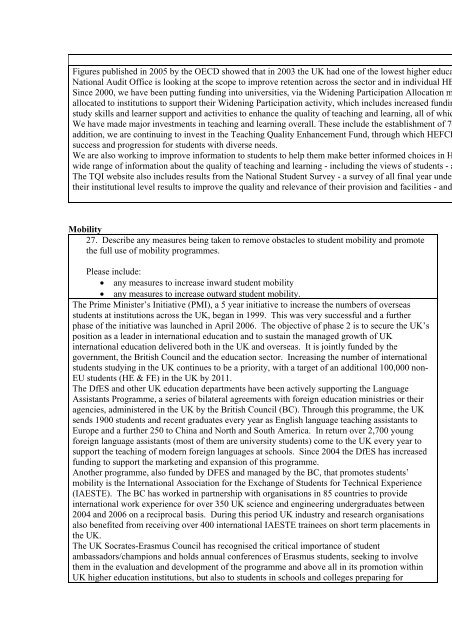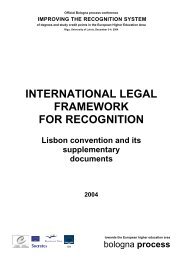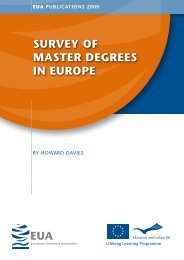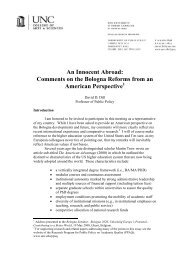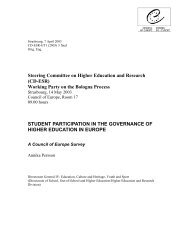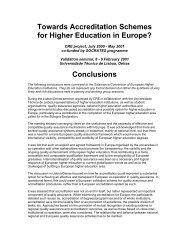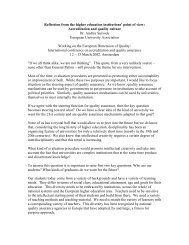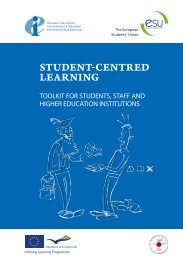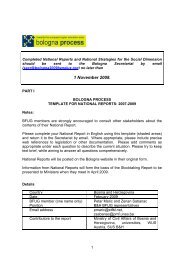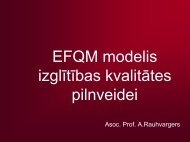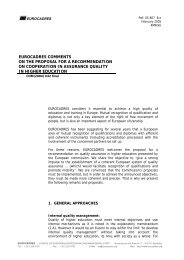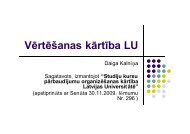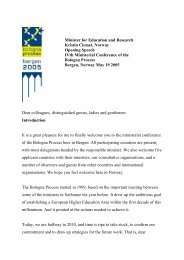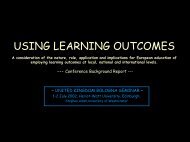BOLOGNA PROCESS - UK England, Wales & Northern Ireland
BOLOGNA PROCESS - UK England, Wales & Northern Ireland
BOLOGNA PROCESS - UK England, Wales & Northern Ireland
Create successful ePaper yourself
Turn your PDF publications into a flip-book with our unique Google optimized e-Paper software.
Figures published in 2005 by the OECD showed that in 2003 the <strong>UK</strong> had one of the lowest higher educaNational Audit Office is looking at the scope to improve retention across the sector and in individual HESince 2000, we have been putting funding into universities, via the Widening Participation Allocation mallocated to institutions to support their Widening Participation activity, which includes increased fundinstudy skills and learner support and activities to enhance the quality of teaching and learning, all of whicWe have made major investments in teaching and learning overall. These include the establishment of 74addition, we are continuing to invest in the Teaching Quality Enhancement Fund, through which HEFCEsuccess and progression for students with diverse needs.We are also working to improve information to students to help them make better informed choices in Hwide range of information about the quality of teaching and learning - including the views of students - aThe TQI website also includes results from the National Student Survey - a survey of all final year undertheir institutional level results to improve the quality and relevance of their provision and facilities - andMobility27. Describe any measures being taken to remove obstacles to student mobility and promotethe full use of mobility programmes.Please include:• any measures to increase inward student mobility• any measures to increase outward student mobility.The Prime Minister’s Initiative (PMI), a 5 year initiative to increase the numbers of overseasstudents at institutions across the <strong>UK</strong>, began in 1999. This was very successful and a furtherphase of the initiative was launched in April 2006. The objective of phase 2 is to secure the <strong>UK</strong>’sposition as a leader in international education and to sustain the managed growth of <strong>UK</strong>international education delivered both in the <strong>UK</strong> and overseas. It is jointly funded by thegovernment, the British Council and the education sector. Increasing the number of internationalstudents studying in the <strong>UK</strong> continues to be a priority, with a target of an additional 100,000 non-EU students (HE & FE) in the <strong>UK</strong> by 2011.The DfES and other <strong>UK</strong> education departments have been actively supporting the LanguageAssistants Programme, a series of bilateral agreements with foreign education ministries or theiragencies, administered in the <strong>UK</strong> by the British Council (BC). Through this programme, the <strong>UK</strong>sends 1900 students and recent graduates every year as English language teaching assistants toEurope and a further 250 to China and North and South America. In return over 2,700 youngforeign language assistants (most of them are university students) come to the <strong>UK</strong> every year tosupport the teaching of modern foreign languages at schools. Since 2004 the DfES has increasedfunding to support the marketing and expansion of this programme.Another programme, also funded by DFES and managed by the BC, that promotes students’mobility is the International Association for the Exchange of Students for Technical Experience(IAESTE). The BC has worked in partnership with organisations in 85 countries to provideinternational work experience for over 350 <strong>UK</strong> science and engineering undergraduates between2004 and 2006 on a reciprocal basis. During this period <strong>UK</strong> industry and research organisationsalso benefited from receiving over 400 international IAESTE trainees on short term placements inthe <strong>UK</strong>.The <strong>UK</strong> Socrates-Erasmus Council has recognised the critical importance of studentambassadors/champions and holds annual conferences of Erasmus students, seeking to involvethem in the evaluation and development of the programme and above all in its promotion within<strong>UK</strong> higher education institutions, but also to students in schools and colleges preparing for


